How Does Canada Work?
Everything is terrible. The worst it's ever been. No one is happy. Nobody has enough. Poverty, violence, death, crime, pollution, corruption, disease; crisis in education, housing, and government soar
How Is Canada Still Working?
Canada seems like it’s on the brink of collapse—every headline, pundit, and Twitter thread tells us so. And on social media, it’s in the pothole reports and comments where you see it most clearly: frustration over unfulfilled dreams, resentment at the growing gap between those who seem to have everything and those struggling to stay afloat. The holiday posts of idyllic homes and bountiful feasts are often met with a bitter backlash, a collective sigh from those for whom Christmas has become more burden than a blessing—a time of debt, isolation, or estrangement rather than joy. We’re in deep with a housing crisis that locks out a generation, a homelessness crisis that fills our public spaces, a healthcare system that can’t keep up with its own promises, and an immigration strategy that invites people into a country that can’t seem to figure out where to put them, how to support them, or give them anything to do. Taxes climb, infrastructure crumbles, and government at every level seems more and more like the least qualified cohort ever to hold office.
And yet—sort of—Canada works.
How is this possible? How does a country so mismanaged, overregulated, and culturally confused keep the lights on, let alone produce one of the highest standards of living in the world? Ever. Is it sheer luck? Are we just running down the bank account - an inheritance of past wealth? Or have we all misunderstood what “working” even looks like in a country like this?
How does a country this disillusioned, this disorganized, unprotected, and this badly managed not just survive but thrive? Are we so rich beyond our needs that even a bureaucracy gone mad, and an incompetent and unqualified leadership at every level of government—yes, everyone thinks the Prime Minister is the worst ever—can’t push us over the edge of oblivion, or worse, statehood?
THE BEE’s rounded up 22 theories that might explain this paradox. Some are grounded in hard facts. Others flirt with conspiracies. All are an attempt to make sense of how a country can be perpetually on the verge of dysfunction while maintaining its place among the world’s most admired and history’s wealthiest nations. If you think you’ve got it all figured out, explain it in the comments.
Let’s dig in.
Optimistic Possibilities: Canada is Functioning as Intended and We Just Don’t See, Appreciate, or Understand It
Canada - The Pinnacle of Democracy and Systems
Canada is the modern pinnacle of democracy, with institutions and systems functioning better than perceived.
Checks, balances, and multi-level governance (federal, provincial, municipal) prevent catastrophic failure, ensure stability and keep things working no matter what.
Canadians are overly critical, expecting perfection for every single citizen or even visitor, but the system’s resilience keeps things moving and we accept some imperfections. The only real complaint is a relative one - some people have more than others.
People are just wrong about the world and the way things are and they don’t want to know the truth as it is readily available in data, because the truth would undermine their victimhood.
Science, Technology, and Innovation amplify productivity and prosperity
Advances in science, technology, and innovation have increased productivity to unprecedented levels far beyond our needs no matter what we imagine them to be.
Automation and globalization allow mistakes to be absorbed without catastrophic consequences.
A knowledge-based economy outpaces inefficiencies in traditional sectors.
Canada’s Wealth of Resources is nearly boundless
Natural resources, including energy, agriculture, water, and minerals, provide a safety net.
Vast land and a relatively small population allow for mistakes without depleting resources.
Pragmatic or Systemic Theories: We’ve Been Saved By Economics
A Rich Nation With Few Needs
Canada is so wealthy and naturally advantaged that inefficiencies and waste don’t matter.
Resource wealth masks systemic flaws and allows suboptimal systems to persist.
Global Economic Integration
Canada’s integration into the global economy provides stability through trade, investment, and partnerships.
Strong relations with the U.S., Europe, and China sustain the economy even as internal systems falter.
Incrementalism Works
Canada’s slow, incremental approach to governance avoids extremes that destabilize other nations.
Policies rarely swing too far left or right, preventing radical changes that can break systems.
Cynical or Alarmist Perspectives: We’re Serving a Nefarious Purpose
Fiddling While Rome Burns
Canada is not actually succeeding but is in a slow, little-noticed decline while societal issues grow.
Public perception lags behind reality, and people are numbed by distractions and relative material wealth.
A Hidden Slave Class
Canada’s wealth and success are built on the exploitation of an invisible underclass, either domestically (e.g., migrant workers) or internationally (e.g., outsourced labor in developing countries).
Canada is a practicing and modern reverse colonialism where other countries are exploited for their most valuable labour resources
China’s Long Game
China, through economic influence and trade, is strategically underwriting Canada’s economy to gain leverage.
This could be a form of economic imperialism aimed at weakening Canada’s independence.
Corporate Conspiracy
Canada is run by an elite capitalist class that manipulates systems for profit while keeping the majority content with consumerism and debt.
A system of “benign exploitation” keeps people trapped in cycles of work and consumption.
Ideological Interpretations: Our Established Systems Are Awesome
Progressive Wealth Redistribution
Social safety nets, universal healthcare, and progressive taxation ensure a minimum standard of living that ultimately benefit everyone.
Despite inefficiencies, these systems prevent total societal breakdown.
The Inertia of Capitalism
A capitalist economy sustains itself despite flawed policies, driven by market forces, competition, and innovation.
Things are so good in the Capitalist system nothing really matters, it can do no wrong no matter how dumb and mismanaged it is.
The Myth of Decline
Perceptions of failure are exaggerated by media, politics, and false nostalgia.
Canada is simply evolving, and “decline” is a misunderstanding of broader social changes.
Cultural or Psychological Factors: Our Complaining Makes Us Better
Cultural Stoicism
Canadians are resilient and adaptable, finding ways to work around broken systems without revolting.
Relative Comparison Bias
Canadians compare their system to perfection rather than to worse systems globally and historically, amplifying dissatisfaction.
National Character
A collective identity focused on politeness, compromise, and tolerance keeps societal tensions manageable.
Constant Complaining Drives Improvement
Canadians’ dissatisfaction with the status quo drives innovation and improvement.
The cultural habit of imagining "more and better" creates progress but ensures perpetual unhappiness, as expectations rise faster than achievements.
Philosophical and Wild Theories: The System is Complax Beyond Our Imagining
Luck and Geography
Canada’s geographic isolation protects it from geopolitical turmoil and allows it to prosper without significant conflict.
Its climate and resources inherently provide a baseline for prosperity.
The Simulation Theory
Canada’s inexplicable success is evidence we’re living in a simulation where the system is rigged to prevent failure.
Divine Providence or Fate
Canada’s success is guided by some higher power or unexplainable cosmic luck.
Money Is Not Real
Canada operates in a largely untethered financial reality where money and wealth have become abstract.
Economic success is an illusion sustained by global faith in fiat currency systems.
Surpassing Basic Human Needs
Canada has so far surpassed basic human needs that most jobs and industries serve invented purposes, therefore most of our problems are illusory compared to past economics.
The economy thrives on leisure, consumption, and complexity, but this abundance removes purpose, causing stress and dissatisfaction.
Canadians invent problems and crises because their basic needs are close to universally met.
Canada isn't perfect. What country is? Ever in history? But there’s something here that keeps us ticking, often in ways that even we don’t fully appreciate. Maybe it’s our ability to take the good with the bad, and live with certain contradictions and tensions, or maybe it's just the sheer amount of politeness in the air and the way it mixes with the negativity and ‘can’t do’ attitude. Either way, the country's still got some gas in the tank in spite of all that’s been huffed by teenagers and siphoned for four-wheelers. I’d love to hear your thoughts—are we really failing, or is it just the loudest voices of despair making the most noise? Drop your feedback, share your thoughts, and let’s stir the pot!
If you comment pick your top three numbers or add in your own ideas.


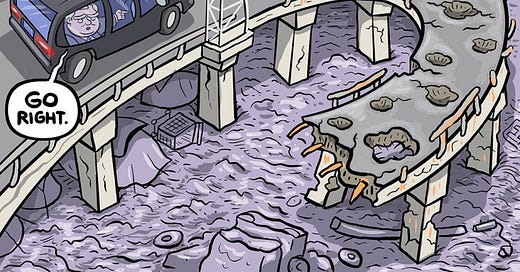



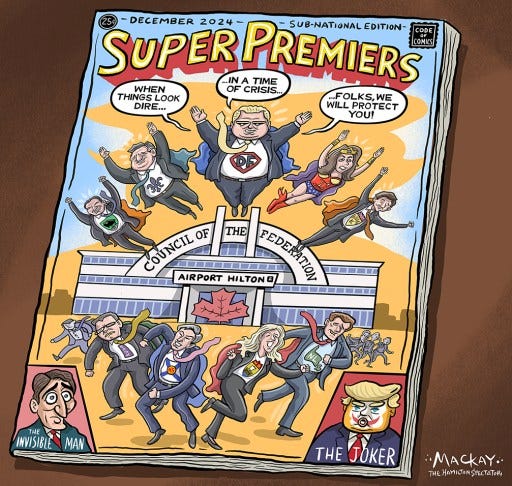
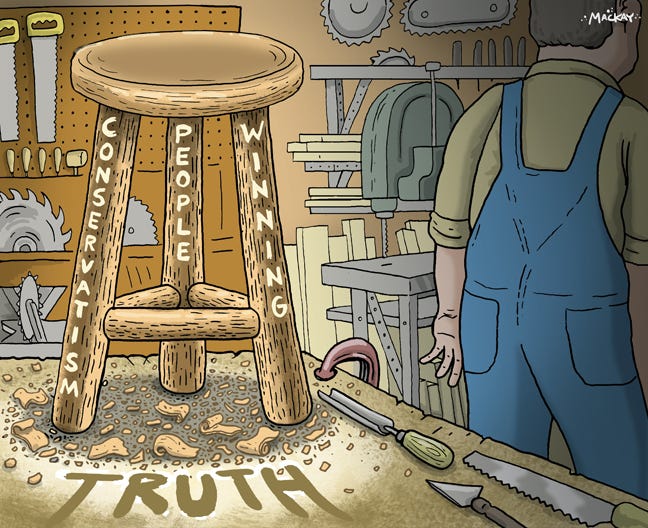
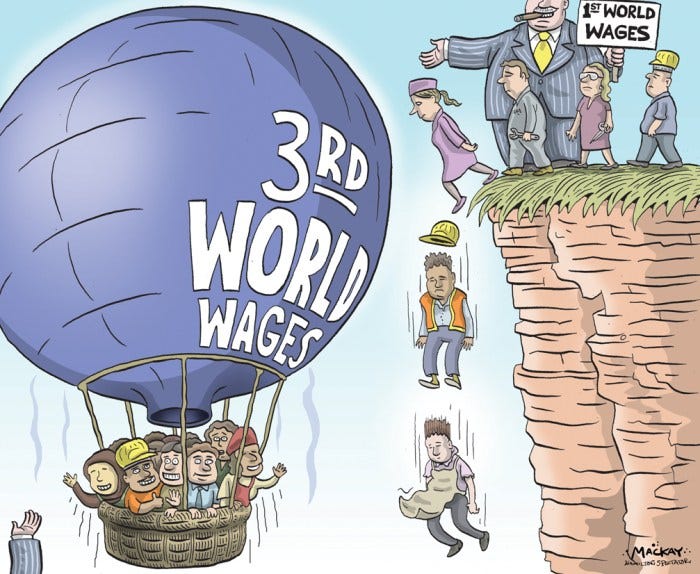

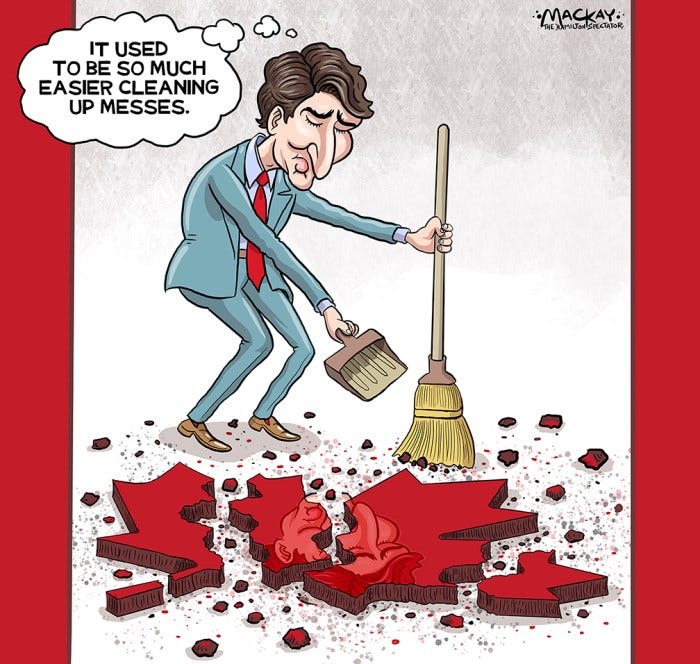
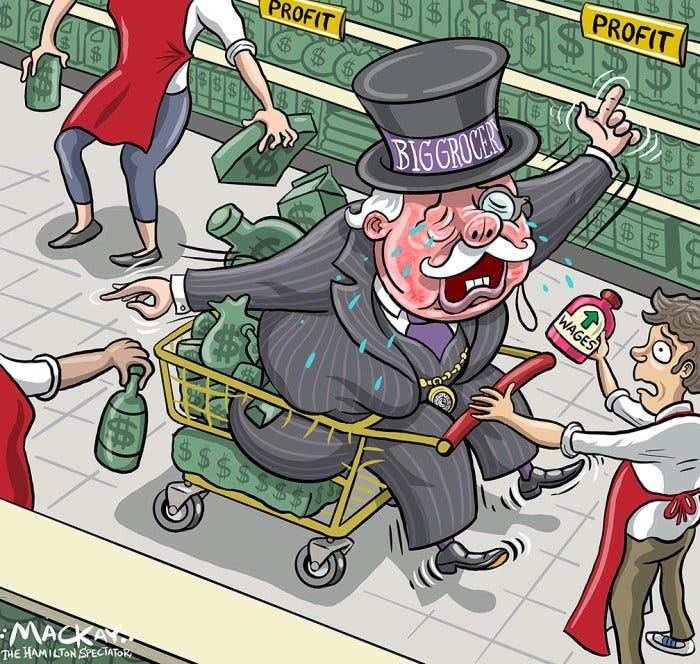
all of the above. really. BUT, and this is my 2 cents...Canada is a suite on the NEW TITANIC, somewhere on the top aft-deck with its own swimming-pool, dance-band, Timmies, trawl lines off the aft-rail , nowhere near the ships-wheel being wrestled by the Chinese, Russian and American suites, as the vessel sails full-tilt into the rapidly shrinking ice-field. What could go wrong?